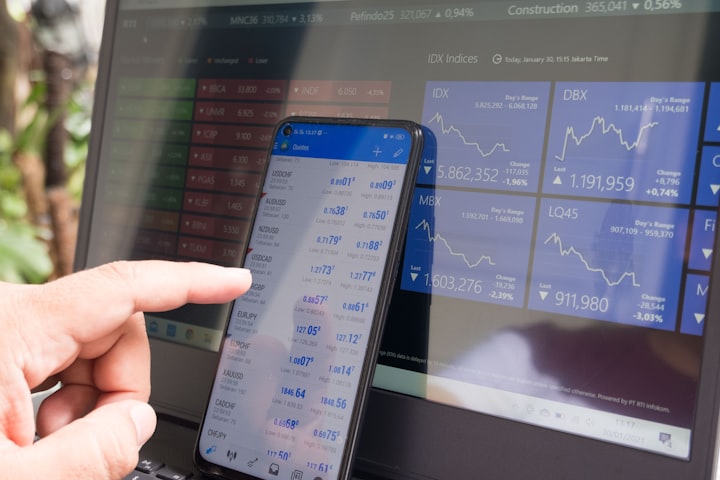Is trading currency safe? Why is Forex high risk?
Trading currency, commonly known as Forex (foreign exchange) trading, can be both safe and high-risk, depending on how it's approached and the trader's level of experience and risk management practices.

Trading currency, commonly known as Forex (foreign exchange) trading, can be both safe and high-risk, depending on how it's approached and the trader's level of experience and risk management practices. Let's explore both aspects:
1. Safe Aspects of Forex Trading:
- Regulated Brokers: Trading with reputable and regulated brokers can enhance the safety of Forex trading. Regulated brokers are required to adhere to strict financial regulations, ensuring fair practices and safeguarding clients' funds.
- Education: Knowledge and education are essential to trade Forex safely. Traders who take the time to learn about the market, technical and fundamental analysis, and risk management strategies have a better chance of making informed decisions.
- Risk Management: Implementing proper risk management techniques, such as using stop-loss orders and managing position sizes, can mitigate potential losses and provide a safety net in volatile markets.
- Demo Accounts: Most brokers offer demo accounts, allowing traders to practice and test their strategies in a risk-free environment before trading with real money.
2. High-Risk Aspects of Forex Trading:
- Volatility: The Forex market is highly volatile, with prices constantly fluctuating due to various factors such as economic data releases, geopolitical events, and market sentiment. This volatility can lead to rapid and unpredictable price movements.
- Leverage: Many Forex brokers offer leverage, which allows traders to control larger positions with a smaller amount of capital. While leverage can amplify potential profits, it also significantly increases the risk of substantial losses. High leverage can lead to rapid account depletion if not managed properly.
- Lack of Centralized Regulation: The Forex market is decentralized, meaning it has no central exchange or regulatory body. While this provides traders with access to a 24/5 market, it also makes the Forex market more susceptible to scams, fraud, and manipulation by unregulated brokers and entities.
- Emotional Factors: Emotions, such as fear and greed, can cloud a trader's judgment and lead to impulsive decisions. Emotional trading can result in significant losses and erode capital quickly.
- Overnight Risk: Forex positions are typically held overnight, exposing traders to potential market gaps and price movements when the market reopens, especially during periods of high volatility or news events.
Conclusion:
Forex trading can offer substantial opportunities for profit, but it also comes with inherent risks. The key to trading currency safely is to approach it with proper education, a well-defined trading plan, strict risk management practices, and emotional discipline. It is crucial to understand that while Forex trading can be profitable, it is not a guaranteed path to wealth and requires ongoing learning and adaptation to changing market conditions. As with any form of trading or investment, individuals should only trade money they can afford to lose and should seek advice from qualified financial professionals if necessary.
Trading currency, also known as Forex trading, carries both potential rewards and risks. While it can be profitable, it is also considered high risk due to several factors:
1. Volatility: The Forex market is known for its high volatility. Currencies can experience significant price fluctuations within short periods, leading to potential rapid gains or losses. While volatility presents opportunities for profit, it also amplifies the risk.
2. Leverage: Forex brokers often offer high leverage, allowing traders to control larger positions with a smaller amount of capital. While leverage can increase potential profits, it also magnifies losses. Inexperienced traders who misuse leverage can suffer substantial losses quickly.
3. 24-Hour Trading: The Forex market operates 24 hours a day, five days a week. Constant trading opportunities might seem advantageous, but it can lead to exhaustion and overtrading, especially for traders who lack discipline or are emotionally driven.
4. Market Manipulation: Given the decentralized nature of the Forex market, it is susceptible to market manipulation. Large financial institutions or powerful individuals can influence currency prices, causing unpredictable price swings that affect traders.
5. Geopolitical and Economic Factors: Currency values are heavily influenced by economic indicators and geopolitical events. Unexpected news, political instability, economic crises, or changes in central bank policies can lead to sharp market movements, making it challenging to predict price direction accurately.
6. Lack of Regulation: The Forex market operates globally and lacks a centralized exchange. While there are regulatory bodies overseeing the industry, it is less regulated than other financial markets. This can expose traders to fraudulent brokers and unethical practices.
7. Psychological Factors: Successful trading requires emotional discipline and the ability to manage psychological factors such as fear and greed. Traders who let emotions dictate their decisions are more likely to make impulsive and irrational choices, leading to losses.
8. Lack of Knowledge: Entering the Forex market without sufficient education and understanding of trading strategies can be extremely risky. Traders need to conduct thorough research, employ risk management techniques, and have a well-thought-out trading plan to minimize risks.
In summary, trading currency can be profitable, but it is inherently high risk due to factors like market volatility, leverage, geopolitical events, lack of regulation, and psychological challenges. Traders should approach Forex trading with caution, employ risk management strategies, and continuously educate themselves to increase their chances of success and manage potential losses effectively.
Trading currency, also known as Forex (foreign exchange) trading, can be both safe and risky, depending on how it is approached. Let's explore the factors that make Forex trading high risk:
1. High Volatility: The Forex market is the largest and most liquid financial market in the world. With a daily trading volume exceeding trillions of dollars, it is highly volatile. Volatility can lead to rapid price movements, which can generate substantial profits, but it also increases the risk of significant losses.
2. Leverage: Forex trading often involves the use of leverage, which allows traders to control larger positions with a smaller amount of capital. While leverage can amplify potential profits, it also magnifies losses. A small adverse movement in the market can result in significant losses if high leverage is used.
3. 24/5 Market: Unlike other financial markets, Forex operates 24 hours a day, five days a week, due to its global nature. This continuous trading can lead to unexpected price gaps and fluctuations, particularly during news events and economic announcements, exposing traders to increased risk.
4. Geopolitical and Economic Factors: The currency market is influenced by various geopolitical and economic factors, such as political stability, interest rates, inflation, and economic performance of countries. Sudden changes in these factors can lead to unpredictable market movements, making Forex trading riskier.
5. Lack of Central Exchange: The Forex market is decentralized, meaning there is no central exchange or clearinghouse. Instead, it operates through an electronic network of banks, financial institutions, and individual traders. This lack of a central authority can make it harder to regulate and can potentially expose traders to fraudulent practices.
6. Emotional Decision Making: Trading in a volatile and fast-paced market can lead to emotional decision-making, driven by fear and greed. Emotions can cloud judgment and cause traders to deviate from their trading plans, increasing the risk of losses.
7. Lack of Experience and Knowledge: Many new traders enter the Forex market without sufficient education and experience. Lack of knowledge about trading strategies, risk management, and market analysis can lead to significant losses.
Despite the high risk associated with Forex trading, it is important to note that risk can be managed effectively through education, discipline, and cautious trading practices. Traders who take the time to learn about the market, develop a sound trading plan, and implement risk management strategies can significantly reduce the level of risk and increase their chances of success in Forex trading.
About the Creator
Forexwebstore
Forexwebstore.com Discover the Best Forex Indicators for a Simple Strateg. This page features key technical indicators for the most popular currency pairs in real time.






Comments
There are no comments for this story
Be the first to respond and start the conversation.